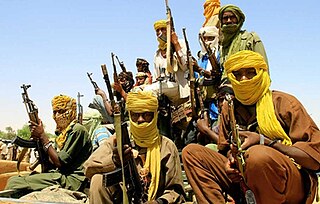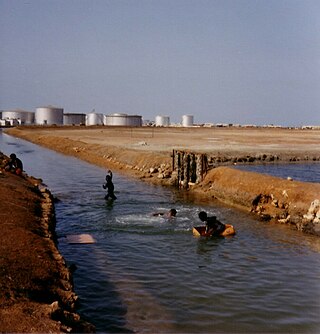
Sudan, officially the Republic of the Sudan, is a country in Northeast Africa. It borders the Central African Republic to the southwest, Chad to the west, Libya to the northwest, Egypt to the north, the Red Sea to the east, Eritrea and Ethiopia to the southeast, and South Sudan to the south. Sudan has a population of nearly 50 million people as of 2024 and occupies 1,886,068 square kilometres, making it Africa's third-largest country by area and the third-largest by area in the Arab League. It was the largest country by area in Africa and the Arab League until the secession of South Sudan in 2011; since then both titles have been held by Algeria. Sudan's capital and most populous city is Khartoum.

Omdurmán is a major city in Sudan. It is the second most populous city in the country, located in the State of Khartoum. Omdurman lies on the west bank of the River Nile, opposite and northwest of the capital city of Khartoum. It is on the Nile river and acts as an important road hub, with the Nile boosting transportation even further.
The Janjaweed are an Arab nomad militia group from the Sahel region that operates in Sudan, particularly in Darfur, and eastern Chad. They have also been speculated to be active in Yemen. According to the United Nations definition, Janjaweed membership consists of Arab nomad tribes from the Sahel, the core of whom are Abbala Arabs, traditionally employed in camel herding, with significant recruitment from the Baggara.

The Justice and Equality Movement is an opposition group in Sudan founded by Khalil Ibrahim. Gibril Ibrahim has led the group since January 2012 after the death of Khalil, his brother, in December 2011. The JEM supported the removal of President of Sudan, Omar al-Bashir and nation-wide government reform.

The Sudan Liberation Movement/Army is a Sudanese rebel group active in Darfur, Sudan. It was founded as the Darfur Liberation Front by members of three indigenous ethnic groups in Darfur: the Fur, the Zaghawa, and the Masalit, among whom were the leaders Abdul Wahid al-Nur of the Fur and Minni Minnawi of the Zaghawa.

This article covers the period of the history of Sudan between 1985 and 2019 when the Sudanese Defense Minister Abdel Rahman Swar al-Dahab seized power from Sudanese President Gaafar Nimeiry in the 1985 Sudanese coup d'état. Not long after, Lieutenant General Omar al-Bashir, backed by an Islamist political party, the National Islamic Front, overthrew the short lived government in a coup in 1989 where he ruled as President until his fall in April 2019. During Bashir's rule, also referred to as Bashirist Sudan, or as they called themselves the al-Ingaz regime, he was re-elected three times while overseeing the independence of South Sudan in 2011. His regime was criticized for human rights abuses, atrocities and genocide in Darfur and allegations of harboring and supporting terrorist groups in the region while being subjected to United Nations sanctions beginning in 1995, resulting in Sudan's isolation as an international pariah.

The War in Darfur, also nicknamed the Land Cruiser War, was a major armed conflict in the Darfur region of Sudan that began in February 2003 when the Sudan Liberation Movement (SLM) and the Justice and Equality Movement (JEM) rebel groups began fighting against the government of Sudan, which they accused of oppressing Darfur's non-Arab population. The government responded to attacks by carrying out a campaign of ethnic cleansing against Darfur's non-Arabs. This resulted in the death of hundreds of thousands of civilians and the indictment of Sudan's president, Omar al-Bashir, for genocide, war crimes, and crimes against humanity by the International Criminal Court.
The Government of Sudan is the federal provisional government created by the Constitution of Sudan having executive, parliamentary, and the judicial branches. Previously, a president was head of state, head of government, and commander-in-chief of the Sudanese Armed Forces in a de jure multi-party system. Legislative power was officially vested in both the government and in the two houses – the National Assembly (lower) and the Council of States (upper) – of the bicameral National Legislature. The judiciary is independent and obtained by the Constitutional Court. However, following the Second Sudanese Civil War and the still ongoing genocide in Darfur, Sudan was widely recognized as a totalitarian state where all effective political power was held by President Omar al-Bashir and his National Congress Party (NCP). However, al-Bashir and the NCP were ousted in a military coup on April 11, 2019. The government of Sudan was then led by the Transitional Military Council (TMC). On 20 August 2019, the TMC dissolved giving its authority over to the Transitional Sovereignty Council, who were planned to govern for 39 months until 2022, in the process of transitioning to democracy. However, the Sovereignty Council and the Sudanese government were dissolved in October 2021.

Sudan–United States relations are the bilateral relations between Sudan and the United States. The United States government has been critical of Sudan's human rights record and has dispatched a strong UN Peacekeeping force to Darfur. Relations between both countries in recent years have greatly improved, with Sudan's post-revolutionary government compensating American victims of al-Qaeda terror attacks, the removal of Sudan from the State Department's blacklist of state sponsors of terrorism and the United States Congress having reinstated Sudan's sovereign immunity in December 2020.

China–Sudan relations are the bilateral relations between the People's Republic of China and the Republic of Sudan. China is currently one of Sudan's largest trade partners, importing oil and exporting low cost manufactured items as well as armaments into the country. Both states enjoy a very robust and productive relationship in the fields of diplomacy, economic trade, and political strategy. They formally established diplomatic relations on February 4, 1959, when Sudan formally recognized the sovereignty of the People's Republic of China and have since become close global allies, supporting each other in times of internal crises and international controversy such as during the Second Sudanese Civil War, the Darfur Crisis, and the Xinjiang Conflict. China continues to provide massive support to Sudan by developing its oil resources and supplying millions of dollars in loans, aid, foreign direct investments, and humanitarian assistance. In return, Sudan has become a reliable political and economic ally in the international arena, allowing China to maintain a significant stake in its oil sector.

The Sudan People's Liberation Movement–North, or SPLM–N, is a political party and militant organisation in the Republic of the Sudan, based in the states of Blue Nile and South Kordofan. The group's armed forces are formally known as the Sudan People's Liberation Army–North or SPLA–N. In 2011 when South Sudan broke away from Sudan to form a new country, most of the Sudan People's Liberation Movement (SPLM) and Army (SPLA) left with it, leaving units remaining across the border in Sudan to form the SPLA–N.

The Sudanese conflict in South Kordofan and Blue Nile was an armed conflict in the Sudanese states of South Kordofan and Blue Nile between the Sudanese Armed Forces (SAF) and the Sudan People's Liberation Movement–North (SPLM-N), a northern affiliate of the Sudan People's Liberation Movement (SPLM) in South Sudan. After some years of relative calm following the 2005 agreement which ended the second Sudanese civil war between the Sudanese government and SPLM rebels, fighting broke out again in the lead-up to South Sudan independence on 9 July 2011, starting in South Kordofan on 5 June and spreading to the neighboring Blue Nile state in September. SPLM-N, splitting from newly independent SPLM, took up arms against the inclusion of the two southern states in Sudan with no popular consultation and against the lack of democratic elections. The conflict is intertwined with the War in Darfur, since in November 2011 SPLM-N established a loose alliance with Darfuri rebels, called Sudan Revolutionary Front (SRF).

The Sudan Revolutionary Front, or the Sudanese Revolutionary Front (SRF), is an alliance between Sudanese factions that was created in opposition to the government of President Omar al-Bashir. It was declared on 12 November 2011, following several months of support by Darfuri rebel groups for the Sudan People's Liberation Movement-North in the conflict in South Kordofan and Blue Nile.

The Rapid Support Forces is a paramilitary force formerly operated by the Government of Sudan. The RSF grew out of, and is primarily composed of, the Janjaweed militias which previously fought on behalf of the Sudanese government. Its actions in Darfur qualify as crimes against humanity in the opinion of Human Rights Watch.

The mining industry of Sudan is mostly driven by extraction fuel minerals, including gold. Prior to becoming independent in 2011 as South Sudan, petroleum extraction in the autonomous region of Southern Sudan accounted for a substantial contribution to the country's economy. Following South Sudan's independence, growth in the gold mining industry saw substantial traction. By 2022, Sudan would emerge as the third-largest producer of gold in Africa.

Mohamed Hamdan Dagalo, generally referred to mononymously as Hemedti, Hemetti, Hemeti, or Hemitte, is a Janjaweed leader from the Rizeigat tribe in Darfur, who was the Deputy head of the Transitional Military Council (TMC) following the 2019 Sudanese coup d'état. Since 2013, Hemetti has commanded the Rapid Support Forces (RSF). He was considered by The Economist to be the most powerful person in Sudan as of early July 2019.
The following lists events that happened during 2020 in Sudan.

DAL Group is a private Sudanese conglomerate, the largest private company in the country. It operates across several business sectors including food, engineering and agriculture.
Events in the year 2021 in Sudan.

A civil war between two major rival factions of the military government of Sudan, the Sudanese Armed Forces (SAF) under Abdel Fattah al-Burhan, and the paramilitary Rapid Support Forces under the Janjaweed leader Hemedti, began during Ramadan on 15 April 2023. Three minor (neutral) factions have participated in the fighting: Darfur Joint Protection Force, SLM (al-Nur) under Abdul Wahid al-Nur, and SPLM-N under Abdelaziz al-Hilu. Fighting has been concentrated around the capital city of Khartoum and the Darfur region. As of 21 January 2024, at least 13,000–15,000 people had been killed and 33,000 others were injured. As of 5 July 2024, over 7.7 million were internally displaced and more than 2.1 million others had fled the country as refugees, and many civilians in Darfur have been reported dead as part of the Masalit Genocide.














